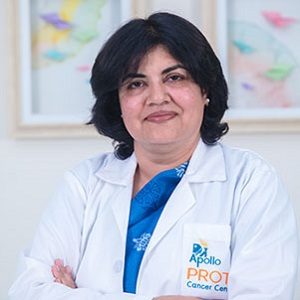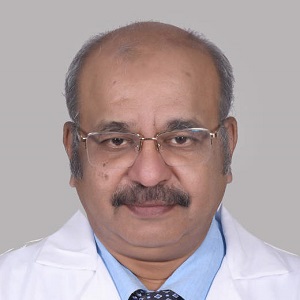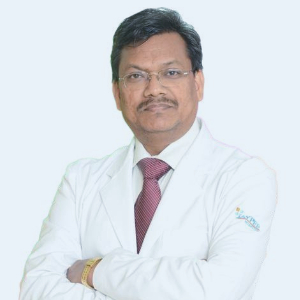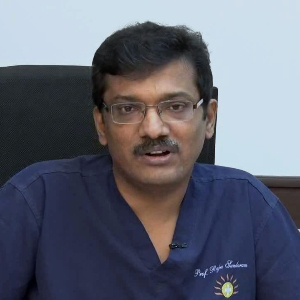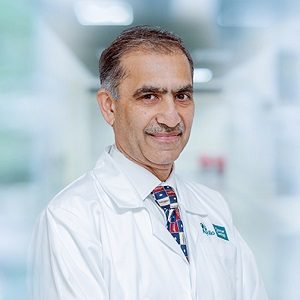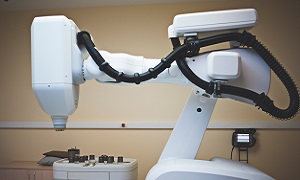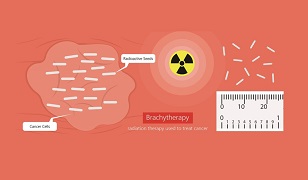Best Prostate Cancer treatment Doctors in India
- Radiation Oncologist, Chennai, India
- Over 33 years’ experience
Profile Highlights:
- Dr. Sapna Nangia is a highly proficient clinical and radiation oncologist with versatile experience in cancer management.
- She has an experience of more than thirty-three years as a doctor and twenty-four years as a doctor across various eminent institutions in the country.
- Dr. Sapna Nangia has been trained for proton therapy at Miami Cancer Care, New York
- Radiation Oncologist, New Delhi, India
- Over 20 years’ experience
Profile Highlights:
- Dr. G K Jadhav is one of the leading radiation oncologists in India.
- He has a complex understanding of cancer biology, clinical care, and radiation physics.
- Dr. Jadhav has an experience of more than 20 years in the field of radiation oncology.
- Surgical Oncologist, Hyderabad, India
- Over 10 years’ experience
Profile Highlights:
- Dr. Girish Kumar is a Surgical Oncologist whose expertise lies in the surgical treatment of both adult and pediatric cancer and provides services for head and neck, breast, GI, bone and soft tissue, urological, colorectal, and gynecological cancers.
- Along with the surgical treatment of various types of cancers, Dr. Girish Kumar also provides pre and post-operative cancer care.
- He has also trained a number of medical students in surgical oncology and continues to mentor postgraduate students.
- Surgical Oncologist, New Delhi, India
- Over 20 years’ experience
Profile Highlights:
- Dr. Pawan Gupta is a well-known Surgical Oncologist in India having more than 2 decades and has performed over 7000 onco-surgeries for head and neck, thoracic, breast, GI, and gynecological cancers.
- Dr. Pawan Gupta is highly trained in different types of cancer surgeries and received his training from the best Cancer centers including Tata Memorial Hospital and SMH Curie Cancer Center.
- Surgical Oncologist, Chennai, India
- Over 25 years’ experience
Profile Highlights:
- Dr. Rajasundaram is a highly successful and experienced Surgical Oncologist with great expertise in performing laparoscopic cancer surgeries.
- He has over 25 years of experience in Surgical Oncology and has performed more than 15,000 cancer-related surgeries till date.
- His expertise lies in the treatment of various types of cancers including organ cancers, solid cancers, blood cancers, inherited cancers, and benign tumors.
- Radiation Oncologist, Gurugram, India
- Over 20 years’ experience
Profile Highlights:
- Dr. Indu Bansal Agarwal is the Director and Senior Consultant in the Department of Radiation Oncology at Narayana Superspeciality Hospital, Gurugram.
- Dr. Indu Bansal Agarwal is extremely skilled in high-end techniques such as SRS, FSRS, IMRT, intraluminal, and interstitial brachytherapy. Her special areas of interest are Pediatric tumors, Central Nervous System Tumors, and Breast, Head and Neck Cancers.
- Dr. Indu Agarwal has co-authored chapters of several books and also has numerous publications to her credit in National and International Journals.
- Radiation Oncologist, Chennai, India
- Over 30 years’ experience
Profile Highlights:
- Dr. Sanjay Chandrasekar serves as a Radiation Oncology consultant at Apollo Hospital of Chennai. His 30+ years-long journey in this field has brought him a lot of appreciation and recognition.
- He diagnoses cancer and provides treatment for the same.
- Radiation Oncologist, Chennai, India
- Over 32 years’ experience
Profile Highlights:
- Dr. Rajendran B has developed expertise in the treatment of conditions like Cancer and Central Nervous System Tumors.
- He has studied radiotherapy and was recognized as the first oncologist to perform radiosurgery in Northern Malaysia in 2008.
- Dr. Rajendran takes interest in engaging in social groups related to his field and holds Indian Medical Association (IMA) membership.
Best Prostate Cancer Treatment Hospitals in India
CK Birla Hospital, Gurugram
- City: Gurugram, India
Hospital Highlights:
- The CK Birla Hospital in Gurugram is a NABH-accredited multi-specialty hospital.
- The hospital strives to increase the quality of healthcare by focusing on UK NHS nurse and midwife training requirements. Policies and practices derived from the National Institute for Health and Treatment Excellence (NICE) recommendations in the United Kingdom ensuring that a strong focus on safety, high-quality clinical care, and sanitation is maintained.
- The hospital’s cutting-edge technology and facilities allow for real-time communication and seamless collaboration among caregivers, ensuring accuracy and the best possible results. Those with foreign experience and accreditations make up part of the hospital’s team of clinicians.
KIMS Hospital, Hyderabad
- City: Hyderabad, India
Hospital Highlights:
- KIMS Hospital (a brand name of Krishna Institute of Medical Sciences) is one of the largest and best multi-speciality hospitals in Hyderabad. The hospital provides various treatments to an enormous number of patients.
- The hospital has a capacity of more than 3000 beds. KIMS Hospitals offers different healthcare services in more than 25 specialities and super specialities.
- The hospital is equipped with modern medical equipment and technology. It has robotic equipment to provide minimal invasive techniques for patients.
- The hospital is aimed at providing world-class healthcare facilities and services at an affordable cost for patients.
- The various specialities and departments of the hospital include neurosciences, gastroenterology & hepatology, robotic science, reproductive sciences, dental science, oncological sciences, organ transplantation, heart and lung transplantation and mother and child care.
Fortis Hospital, Shalimar Bagh
- City: New Delhi, India
Hospital Highlights:
- Fortis Hospital in Shalimar Bagh is a multi-super specialty hospital that strives to provide world-class patient care by leaving no stone unturned.
- Fortis, Shalimar Bagh, with 262 beds and a 7.34-acre footprint, provides the best level of medical care through its team of doctors, nurses, technicians, and management professionals.
Reliance Hospital, Mumbai
- City: Mumbai, India
Hospital Highlights:
- Reliance Hospital is one of the best super-specialty care hospitals in Navi Mumbai.
- The main purpose of this hospital is to become a trustworthy place for the best health and hope for society. The hospital is well connected to the suburbs of Mumbai and Navi Mumbai.
- The hospital has various specialty departments, viz., Accident & Emergency, Anesthesiology, Dental Services, Dermatology, Diabetology, Dietetics Nutrition, Endocrinology, ENT, Gastroenterology, General Surgery, Gynaecology And Obstetrics, Hepato Pancreato Biliary Surgery, Infectious Disease, Internal Medicine, Interventional Radiology, Laboratory Medicine, Minimal Access Laparoscopic Surgery, Nephrology, Neurosciences, Opthalmology, Orthopaedics, Paediatrics, Pain Management Palliative Care, Physical Medicine Rehabilitation, Plastic And Reconstructive Surgery, Psychiatry, Pulmonary Medicine, Radiology, Rheumatology, Transplant, Urology Andrology, Vascular Surgery
Lilavati Hospital & Research Centre, Mumbai
- City: Mumbai, India
Hospital Highlights:
- Lilavati Hospital & Research Centre is India’s premier multi-speciality tertiary care hospital and has been recognised as a global medical excellence centre.
- Lilavati Hospital & Research Centre has built an unrivalled level of trust with its patients over the years, thanks to a solid foundation that comprises cutting-edge facilities, the best medical competence, research, education, and charity endeavours.
- The hospital is quite proud of the fact that it now serves patients from all kinds of backgrounds, not just from the United States but from all around the world.
- The hospital has a total of 323 beds, one of the largest Intensive Care Units (ICUs), 12 Operation Theatres with modern amenities, over 300 consultants, and almost 1,800 personnel.
MGM Healthcare, Chennai
- City: Chennai, India
Hospital Highlights:
- Located in Chennai, India, MGM Healthcare is a top multispecialty hospital that provides all medical services under one roof.
- Since its founding in 2019, MGM Healthcare has quickly become a leading national referral centre, creating several innovative flagship initiatives.
- MGM Healthcare combines next-generation medical and digital technologies to provide better patient results.
- With 12 centres of excellence, more than 400 inpatient beds, 100 intensive care unit beds, and 24/7 emergency care, MGM Healthcare leaves no chance in redefining the patient experience in Chennai.
- MGM Healthcare boasts 250+ expert doctors across 30+ departments, including Cardiology, Pulmonology, Neurology, Obstetrics & Gynaecology, and more.
- They house 12 specialized Centres of Excellence, including Neurosciences, Orthopaedics, and Multi-Organ Transplantation.
- Their team of doctors, nurses, and paramedics works together to give every patient individualized treatment.
Prostate Cancer
Signs & symptoms of Prostate Cancer
- Incontinence or frequent urination
- Pain during urination.
- Blood may be present in urine or semen.
- Pain in pelvis and lower abdomen.
- Pain or burning sensation during urination.
Prostate Cancer causes
- Prostate cancer rarely effects young men.
- Family history
- Overweight or Obesity
- In some cases, it has been noted that taller men are at higher risk than shorter men.
- Swelling or inflammation if the prostate gland.
- Risk of getting prostate cancer is slightly higher in men who have had a vasectomy.
- Diet
- Smoking
Stages of Prostate Cancer
Stage 1: Cancer is at early stage and is growing. You still cant feel the tumor and it involves one-side of prostate or even less. PSA levels are low, and cancer cells still look like healthy cells (well-differentiated)
Stage 2: The tumor is still localized to prostate. PSA level is low to medium. Tumor may grow larger, cancer cells are mostly well-differentiated in earlier phases of stage 2.
Stage 3: In stage 3, PSA levels will be high, the cancer would be growing and may be of high grade too. Cancer may start spreading.
Stage 4: Cancer has spread beyond the prostate. First it reaches the Lymph node and through Lymph node, to other parts of the body.
Grading of Prostate Cancer
As discussed before, not all cases of prostate cancer require immediate treatment. Urgent treatment is recommended only in the case of high grade prostate cancers.
When the tissue sample is taken for biopsy and cancer is confirmed, the pathologists will evaluate the grade of cancer, that is, how fast the cancer is likely to spread. The most common score to measure the grade of prostate cance is called a Gleason score. Gleason score ranges from 2 to 10 where 10 would be extremely high grade prostate cancer. A scale of upto 6 is considered low grade cancer, 7 is considered medium and above 7-10 are high grade prostate cancers.
These days, genomic testings are also done to assess risk factors of Prostate Cancers.
Diagnosis of Prostate Cancer
PSA or Prostate Specific Antigen test
The patient will have high levels of a protein (PSA) that is released by prostate tissue in blood.
Digital rectal exam or DRE
The doctor feels the part by using his/her finger to find abnormal parts of the prostate.
Biomarker test
Biomarker is a substance that is found in the blood, urine, or body tissues of a person with cancer. This test is called as the Biomarker test.
Trans-rectal Ultrasound
The patient undergoes trans-rectal ultrasound in which the picture of prostate gland is taken using sound waves that bounce off the prostate.
Biopsy
A small amount of tissue from the affected area is removed and send for examination. This is known as Biopsy.
Treatment of Prostate Cancer
Depending on the grades of the prostate cancer, further treatment plan in decided.
For low grade prostate cancers, your oncologist may decide to do Active Surveillance involving regular blood tests, rectal exams and biopsies. However, active surveillance may also be risky at times if the cancer suddenly grows between surveillance periods.
For Medium to High Grade Prostate Cancers, following interventions are commonly considered.
Radical Prostatectomy
For Prostate Cancer, the whole prostate gland is removed. The procedure is called Radical Prostatectomy. Radical Prostatectomy is done in two ways:
Laparoscopic or open radical prostatectomy
The surgeon makes one or more incisions in your lower abdomen and takes out the prostate glad.
Robotic radical prostatectomy
These days, high number of patients opt for Robotic Radical Prostatectomy where robotic arms conduct the surgeon with high degree of preciseness and the arm is controlled by the surgeon sitting at the console.
Patient undergoing Radical Prostatectomy could have erectile dysfunction and urinary incontinence. Your urologist will discuss the possible implications of the procedure with you. You can also discuss all your concerns.
Radiation Therapy
Radiation Therapy is a kind of cancer treatment that uses high doses of radiation beams to kill cancer cells to shrink the tumors. Radiation kills the cancer cells by destroying the DNA. Cancer cells with damaged DNA fail to multiply and die. They are then removed by the body’s mechanism.
External Beam Radiation
Cyberknife Radiosurgery
These days, Stereotactic Radiosurgery is commonly used for highly precise and effective radiation doses to prostate cancers. The most popular SRS is Cyberknife Radisourgery. The Cyberknife is a highly advanced SRS machine which delivers robot-controlled radiation beams from 1400 different angles to the tumor. The machine adjusts against movement of the body and does little or no harm to surrounding healthy tissues. Cyberknife doesn’t have any cut and doesnt need any hospitalization. (Know more about Cyberknife Radiosurgery)
Brachytherapy
Brachytherapy is an internal beam radiation therapy technique where radiation seeds, the size of rice grains are placed in the prostate using a needle, guided by ultrasound imaging. The radioactive seeds keep emitting low dose radiation beams to the cancer over a long period of time. At one point, the seeds stop emitting radiation, but do not need to be removed.
Chemotherapy

Chemotherapy is the use of anti-cancer drug that helps to slow or stop the growth of rapidly dividing cells that cause cancer. It prevents the growth of rapidly dividing cells by killing the dividing cells.
Despite its side effects, chemo is still the most widely used cancer treatment option. Unlike radiation and surgery which treats cancer cells at particular locations, chemotherapy drugs can kill cancer cells that have metastated (spread) to different organs in the body (Read more on: Chemotherapy)
Hormone Therapy
Prostate cancers rely on the hormone, Testosterone to grow. Hormone Therapy can stop producing Testosterone, thereby slowing or killing cancer cells of prostate.
*Testosterone is produced in Testicles. Sometimes, doctors can decide to surgically remove the testicles to inhibit testosterone production. The procedure is called Orchiectomy (Read more on: Hormone Therapy)
Cryosurgery or Cryoablation
Cryosurgery uses the principle of freezing and thawing to kill cancer cells. In cryosurgery, ultrasound guided needles are inserted in the prostate on the tumor and extremely cold gas is passed through the needles. Thereafter hot gas is passed again. The process of cooling and heating kills the cancer cells. Cryosurgery is generally used as an option when Radiation Therapy fails to be effective.
Immunotherapy
Immunotherapy (also called biologic therapy) is a new type of cancer treatment where the body’s immune system is boosted to help the body fight cancer by itself. Immunotherapy uses substances made by the body or in a laboratory to improve or restore immune system function ( Read more on: Immunotherapy)

